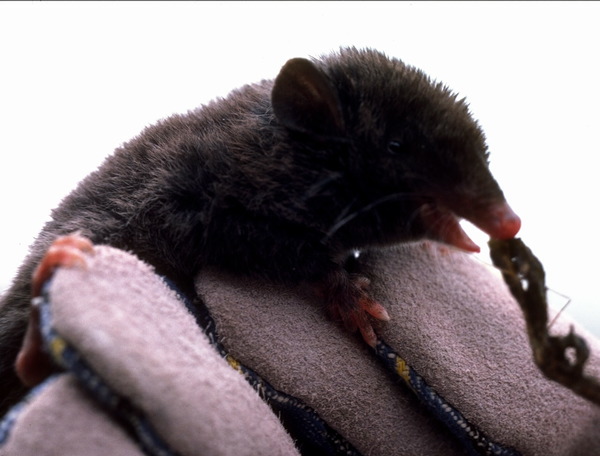

Caenolestids are small, shrew-like animals with small eyes, and thick, gray or gray-brown pelage. The margin of each upper lip is interrupted by a distinctive flap of skin. Their tails are long but not prehensile, and their feet are not syndactylous. Females lack a pouch. Caenolestids have a rounded cranium, weak zygomatic arches, and a long and conical rostrum. Each lower jaw has a large incisor that extends forward from the lower jaw (diprotodont), followed by six or seven small and simple incisors, canines, and premolars, each separated by a space. The upper canines are large stabbing teeth. The first three upper molars have a hypocone (small on the third). The dental formula is 4/3-4, 1/1, 3/3, 4/4 = 46 or 48.
Caenolestids have peculiarly paired sperm. They share this very unusual trait with didelphids, and it provides strong evidence for uniting these two groups in the Cohort Ameridelphia (see account of Metatheria). Paired sperm are not found in any Australian marsupials.
Caenolestids are believed to feed mostly on insects, but they have been seen to use their projecting lower incisors to repeatedly stab baby rodents (which they then ate). They forage in dense vegetation on the ground in dense, cold, and wet forests either at high elevations in the Andes or along the southern coast of Chile.
The earliest members of this group are found in Oligocene faunas of South America. They were diverse in the Oligocene and Miocene.
Family Caenolestidae shrew-like animals<<<<<<<>>>>>>> ARTIODACTYLA CARNIVORA CETACEA CHIROPTERA DASYUROMORPHIA DERMOPTERA DIDELPHIMORPHI DIPROTODONTIA HYRACOIDEA INSECTIVORA LAGOMORPHA MACROSCELIDEA MICROBIOTHERIA MONOTREMATA NOTORYCTEMORPHIA PAUCITUBERCULATA PERAMELEMORPHIA PERISSODACTYLA PHOLIDOTA PRIMATES PROBOSCIDEA RODENTIA SCANDENTIA SIRENIA TUBULIDENTATA XENARTHRA
Email: eradani7@aol.com